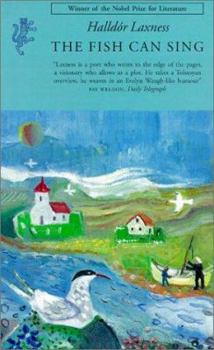The Fish Can Sing
Select Format
Select Condition 
Book Overview
One of the most beloved novels from the Nobel Prize winner, a poignant coming-of-age tale marked with the peculiar Icelandic blend of light irony and dark humor. - With an introduction by Pulitzer... This description may be from another edition of this product.
Format:Paperback
Language:English
ISBN:1860466877
ISBN13:9781860466878
Release Date:January 2000
Publisher:Harvill Press
Length:288 Pages
Weight:0.05 lbs.
Dimensions:0.8" x 5.3" x 8.5"
Customer Reviews
5 ratings
Charming
Published by Thriftbooks.com User , 21 years ago
The charm of this book is in its atmosphere. You get a wonderful feel of early C20 Iceland and the characters that inhabit it, from the old-fashioned fisherman who ignores market economics to the admirer of modern cesspits. The age of the novel, like its hero, progresses from child to early-adolescent. A particularly charming thing about this novel is the way rather grimy adult features of adulthood are transformed by the place and its people. The cesspit-admirer, for instance, sees modern cesspits solely as an exciting new invention; and the farmers, when they discover barbed wire, just string it up in purposeless and harmless lines across the country.The plot involves an orphan boy (Alfgrimur) who might be a gifted singer, his experiences while growing up, and his relationship with the elusive "famous Icelandic singer" Gardar Holm. But "fame" appears to be something petty, the god of Danish shopkeepers (Danes, of course, are grown-up) -- and the "one true note" which Alfgrimur seeks can be attained just as well while singing at funerals in the local churchyard.
A remarkable read
Published by Thriftbooks.com User , 23 years ago
Laxness' book, "The Fish Can Sing" is a remarkable book. At first, it seems like a random series of vignettes about early 20th-century Icelandic life, full of detail and life, but appearing loosely bound at best. But by the end of the novel, the reader realizes he is in the hands of a master craftsman as the rich detail provided in earlier chapters come back to play important roles in the culmination of the book and its plot.There's an endless array of well-defined, complicated, and vivid characters. There's the lavish countryside painted simply - evoking the same feeling you get from a good watercolor. Then there's the plot, which is mysterious and complex, but leaves you with much to ponder.A nod to the translator, Magnus Magnussen, because the prose is fertile and poetic. It's unbelievably rich, yet brilliantly sparse. This is the way prose should be.Laxness and Magnussen have given us a beautiful, soulful book. It's a remarkable read.
A Masterpiece!
Published by Thriftbooks.com User , 23 years ago
This brilliant work amply demonstrates why its author, Halldor Laxness, won the Nobel Prize for Literature in 1955(?). Without much of a plot--it portrays the maturation and awakening of a young man, Alfgrimur Hanson--"The Fish Can Sing" is nonetheless very rich in characterization and aptly depicts life in early 20th century Iceland. As an American who has lived in Iceland for the last two years, I have grown to appreciate Laxness's insight into the character of the proud and independent Icelandic people. I have read two other Laxness books which I could find printed in English--"Under the Glacier" and "Independent People"--and although those are very good, "The Fish Can Sing" is outstanding and clearly my favorite. Humorous, though-provoking and ultimately very moving, this book is one which you will surely enjoy and not readily forget.
The Tao of Lumpfish
Published by Thriftbooks.com User , 23 years ago
I could not help but think while reading this novel of a Frank Capra film from the 1930s entitled YOU CAN'T TAKE IT WITH YOU about an eccentric household headed by Lionel Barrymore full of amiable zanies who stump the frenetic world around them. Laxness, Iceland's only Nobelist, writes of a young orphan named Alfgrim who may or may not be a relative of the great opera singer Gardar Holm, who also hails from Brekkukot, where the old lumpfisherman Bjork maintains a rambling house on the outskirts of what was to become the country's new capital, Reykjavik. This house is filled with lodgers who get to stay rent-free for no other reason than that they ask. Alfgrim keeps crossing paths with Gardar Holm and the young woman who wants to become the singer's lover. For some reason, the singer always cancels his appointments to the chagrin of his sponsors and fans; and the young woman, Blaer Gudmunsen, is always given the slip. The unhappy Holm is in stark contrast to Alfgrim, who maintains his balance by being suspicious of fame and content with a future of gathering lumpfish. In the end, this is an feel-good work of considerable artistry, with a masterful, rich sense of characterization. The translation by Magnus Magnusson is excellent, as befits the man who at one and the same time is both one of the best translators of Icelandic Sagas and the TV host of BBC's MASTERMIND and WHOSE LINE IS IT ANYHOW?
A wonderful, wonderful book
Published by Thriftbooks.com User , 24 years ago
The Fish can Sing (or, as it is known in Icelandic, The Annal of Brekkukot) is one of Laxness's finest and most intimate novels. It successfully weaves together several narrative threads: it is an orphan's lyrical coming-of-age story, a tragic tale of a "world-famous" singer, and a brilliant description of Reykjavik at the beginning of the 20th century, with its quaint combination of old values (as represented by the storyteller's grandparents) and and more modern influences. As in every Laxness book, the characters are colorful and imaginative, yet always true to life. This book is a gem.





